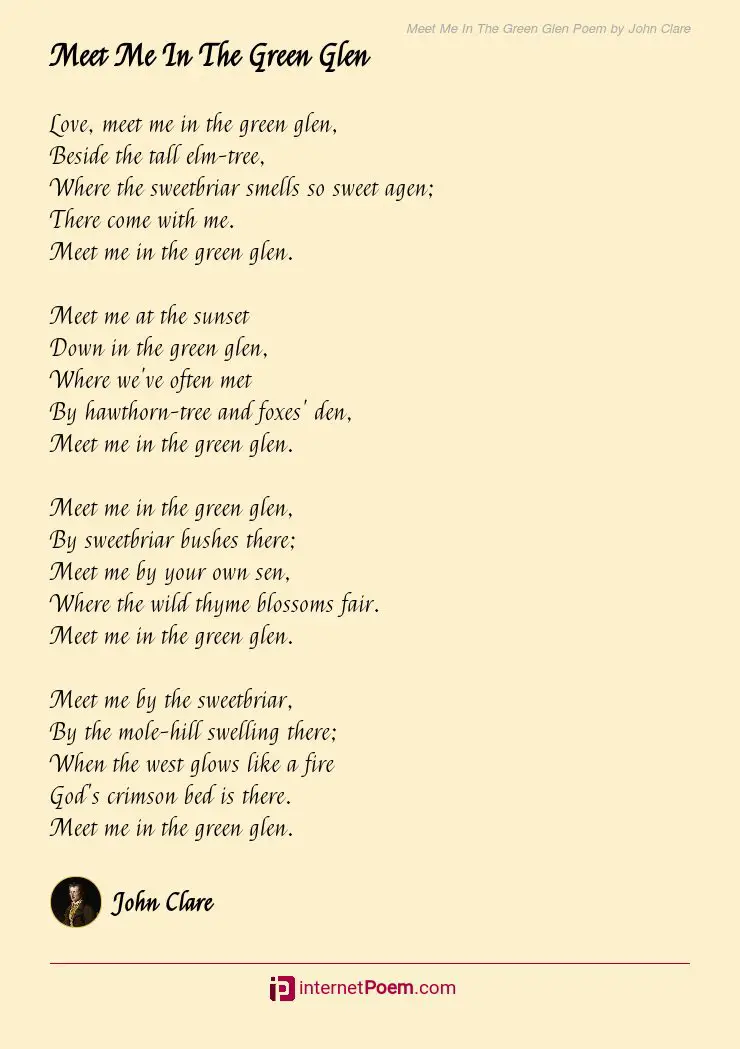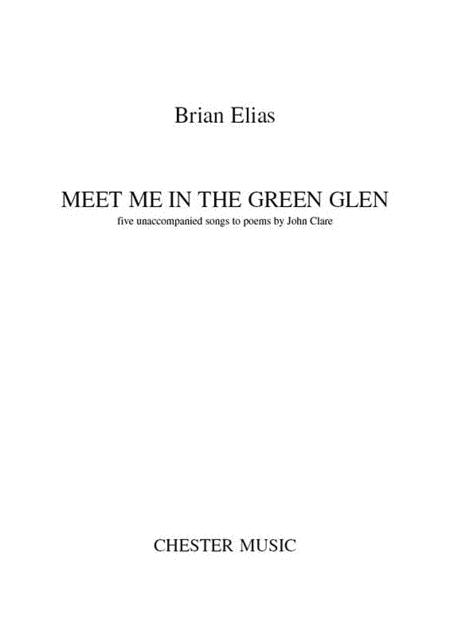“Meet Me in the Green Glen” is a romantic and evocative poem by John Clare that captures the essence of love, nature, and longing. The poem is an invitation from the speaker to his beloved, urging her to meet him in the secluded, verdant glen where they can be free from the prying eyes of the world. The green glen symbolizes a haven of intimacy and natural beauty, a place where their love can flourish without judgment or interruption.
Throughout the poem, Clare employs vivid imagery to paint a picture of the idyllic setting. He describes the softness of the moss, the gentle murmurs of the brook, and the serenity of the environment. These descriptions not only set the scene but also underscore the depth of the speaker’s emotions. The glen becomes a metaphorical space where love, in its purest form, can exist, untouched by societal constraints or expectations.
The recurring refrain, “Meet me in the green glen,” emphasizes the speaker’s yearning and the urgency of his request. The poem resonates with themes of love, nature, and escapism, showcasing Clare’s ability to intertwine human emotions with the natural world. In essence, “Meet Me in the Green Glen” is a heartfelt plea for love to be experienced in its most genuine and unadulterated form amidst nature’s embrace.
Summary
At the start of the poem, the poet utters love by meeting him in the green glen which a tall with love. The elm tree is standing beside and a tantalizing smell of wild rose is coming. Now the poet is asking them to come to him in this greenfield and meet him to fill their heart.
“Where the sweetbriar smells so sweet agen;
There come with me.
Meet me in the
green glen.”
In the next stanza, he further states that,
“Meet me at the sunset
Down in the green glen,
Where we’ve often met
By hawthorn-tree and foxes’ den,
Meet me in the green glen.”
Clare is enunciating here to meet him on the sunset where the sun will be sunk and beneath them, the green glen will lie. There he wants to meet with his beloved. On the field, there will be hawthorn trees and foxen meadows.

Probably the poet is very aggressive about the meeting that is why more and more he is asking about the meeting under veils of nature.
So, the poet’s motive is to show the beloved the beauty of nature where the green field is misting the poet with love.
Now, John Clare goes further to the next stanza where he further utters the same to meet in the field of ‘Green Glen’.
Here, the poet takes one another reference to so the beauty of nature. In the first stanza, we were talking about wild roses that are hung on the trees are spread a nice smell in the world.
The bushed of sweetbriar is there. In the next line again the poet utters to meet with her sen so that the person can enjoy the moment with nature.
“Meet me by your sen,
Where the wild thyme blossoms fair.
Meet me in the green glen.”
The wildflowers have their theme that grows fair with nature and this is why every time the poem states to meet him with nature. So, nature is the main part of the poem as he wants to look forward to nature.
“Meet me by the sweetbriar,
By the mole-hill swelling there;
When the west glows like a fire
God’s crimson bed is there.
Meet me in the green glen.”
So these are the very last lines where again he exaggerates the beauty of the world. He wants to meet when the hills will be filled with red roses and will look like heaven.
Also, he wants to meet when the west will blow the fiery wind and God’s crimson bed will be made automatically by nature. John Clare will meet at that time when nature will be more beautiful.
Analysis and Theme
This poem is talking about nature every time. This poem is written in lucid verse so the meaning is very clear for all the readers. Only nature plays a grand role.

Poet’s motive is to meet the beloved in the field of ‘green glen’. Thus green glen becomes a very attractive part of nature that all the readers are looking for. The theme is also very clean and clear.
The primary theme of the poem is nature and after that, the field of green glen also plays an important role. This is seen when John Clare is dedicating his meeting to the field of the green glen.
Literary Devices
In a poem, literary devices are the most significant part because it riches the content by using rhetoric. The rhyming pattern of the poem is also a relevant part. Here, Clare uses “ababa acacc aeae ghgha”. This rhyming pattern is a bit complex.
Syncope is an important literary device that refers to writing a word used with an apostrophe. For example, “we’ve”, “foxes'”
Then comes alliteration which means the repetition of the same sounds used in a single line.
“sweetbriar smells so sweet”
Here, the ‘s’ sound is repeated at the start of every word.
Then comes oxymoron that used to be written when the poet writes two different or opposite kinds of words together like,
“mole-hill”
Later comes the most common device imagery. The poet uses many images to grab the attention of the readers. So, these are the relevant devices that play important roles in the poem.